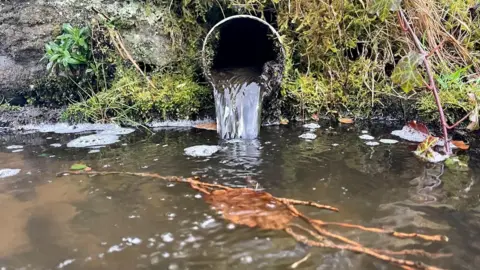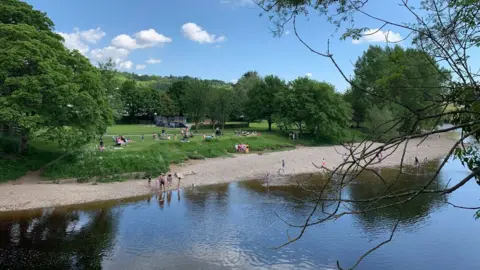Serious water pollution incidents increased in Yorkshire last year
 BBC
BBCParts of Yorkshire have some of the highest number of serious water pollution incidents in England, Environment Agency (EA) figures show.
In the top five areas last year were Kirklees and Bradford, with eight incidents each, and Leeds with seven.
Sewage and slurry were the two most commonly identified pollutants over the past year, according to a BBC analysis of the data.
The Rivers Trust said there was "no sign" of serious pollution going down.
The most serious incidents are logged as category one and two in the EA data.
Overall Yorkshire saw 48 such incidents in the reporting period from 2020 to 2021, an increase from 41 in the previous year.
A category one incident has a "major effect" on either water quality, human health, conservation or businesses, while category two has a "significant effect".
Yorkshire Water said that last year three of the serious incidents were sewage discharges from its plants.
Ben Roche, director of wastewater at the utility firm, said: "Water pollution does come from a variety of sources, such as industry, agriculture and the water sector, and it is important we all play our part in reducing pollution incidents where we are responsible."

Mark Lloyd, chief executive of environmental charity the Rivers Trust, said the figures only revealed serious incidents.
"There are many more which are less significant, but are causing death by a thousand cuts for our rivers," he added.
A stretch of the River Wharfe near Ilkley last year become the first in England to be designated a bathing site. It now has its pollution levels monitored by the EA to ensure it is safe for swimming.
Andrew Gibson from the Yorkshire Wildlife Trust said that it was a "collective obligation" to reduce river pollution.
"You've got to work over the whole length of the river system," he said.
"Just looking at the narrow corridor of a river isn't sufficient. We need to move into the land that feeds into that river.
"It goes across the board that everybody has to do something"

Follow BBC Yorkshire on Facebook, Twitter and Instagram. Send your story ideas to yorkslincs.news@bbc.co.uk.
